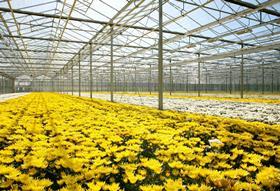
The Fresh Produce Consortium (FPC) is calling on the government to secure the UK’s flower trading relationships with its key partners post-Brexit.
The UK imports 78 per cent of its cut flowers, roses and indoor plants from the Netherlands, while Kenya and Colombia account for 9 per cent of British imports – mainly cut roses, carnations and chrysanthemums.
“The UK ornamental plants and flower industry is worth around £1.2 billion,” said chief executive of the Fresh Produce Consortium Nigel Jenney.
“We import around 85 per cent of our cut flowers so it’s vital that we secure strong beneficial trading relationships with our key partners such as the Netherlands, Kenya and Colombia after Brexit.”
He added: “It will be crucial to secure preferential trade tariffs to protect our industry and stave off significant price increases for UK consumers.
“We’ve seen the potential for increased duties for cut flowers to have a major impact when negotiations stalled on reinstating duty-free access for Kenyan exports to the EU market. Thankfully this was resolved, but it shows the importance of maintaining a vigilant eye on trade negotiations.”
Several products benefit from reduced levels of plant health inspections and reduced fees based upon good compliance thanks to the UK’s membership of the EU. FPC wants to maintain reduced fees for plant health inspections on cut flowers from certain origins and avoid delays at ports for these perishable products.
The UK government increased its focus on plant health following the threat of Phytophthora ramorum (Sudden Oak Death) and ash dieback. Further developments in mainland Europe such as the spread of the bacterium Xylella Fastidiosa and interceptions of soil-borne pests in potted ornamentals mean that plant health and biosecurity will remain important issues.
British growers account for 15 per cent of the volume of cut flowers sold in the UK so there is a tremendous opportunity for UK flower growers to increase their share of the UK market as well as expanding exports. But concerns about fluctuating exchange rates between the pound and the euro are affecting the costs of inputs, including planting materials, and the provision of temporary labour are causing concerns.
FPC is calling on the UK government to ensure access to the EU labour market and to give greater confidence to non-UK workers to continue to work here. UK growers rely on seasonal workers from overseas for harvesting and packing cut flowers and bulbs, with many workers moving from the south west to the north of England to follow the harvest periods.
“Consumers love the glorious range of flowers available on the UK market and it’s vital that we continue to provide them with the wide selection which they enjoy today,” added Jenney. “The UK Government must recognise the value to UK consumers and support this innovative sector of our industry.”



